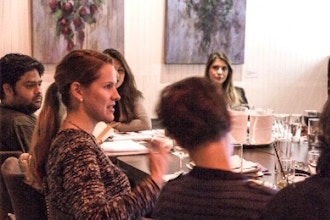The Ancient Novel? Magic, Myth, and Metamorphosis
- All levels
- 21 and older
- $315
- Earn 3,150 reward points
- Online Classroom
- 12 hours over 4 sessions
Thankfully we have 6 other Lecture Classes for you to choose from. Check our top choices below or see all classes for more options.
Brooklyn Institute for Social Research @ Online Classroom
Embark on a riveting exploration of trust, deceit, and existential uncertainty in Herman Melville’s masterpiece. Join us as we dissect The Confidence-Man, delving into its satire of capitalist modernity and probing questions of faith, knowledge, and societal norms.
May 5th
2–5pm EDT
Meets 4 Times
Brooklyn Institute for Social Research @ Online Classroom
Delve into the profound intersections of race, class, and capitalism in a thought-provoking exploration of contemporary radical movements. Join us for an in-depth examination of Cedric Robinson’s concept of racial capitalism and its implications for understanding modernity, nationalism, and Black Radicalism.
May 7th
6:30–9:30pm EDT
Meets 4 Times
Brooklyn Institute for Social Research @ Online Classroom
Embark on a captivating exploration of Mesopotamian civilization through archaeology and material culture. Join us as we delve into the origins, structures, and legacy of this ancient society, unraveling its significance amidst historical interpretations and contemporary geopolitical contexts.
May 8th
6:30–9:30pm EDT
Meets 4 Times
Brooklyn Institute for Social Research @ Online Classroom
Uncover the entwined history of psychoanalysis and state power in a captivating exploration of repression tactics. Join us as we delve into the intersections of Freudian theory with military strategy, urban policing, and guerrilla warfare.
May 12th
2–5pm EDT
Meets 4 Times
Brooklyn Institute for Social Research @ Online Classroom
Delve into the complex terrain of pregnancy politics, exploring gestational labor, abortion rights, and reproductive justice. Join us for a deep dive into theoretical frameworks, historical perspectives, and contemporary debates surrounding the manufacture of human fetuses.
May 12th
2–5pm EDT
Meets 4 Times
Is the novel an intrinsically modern form? Are prose works like Satyricon, Daphnis and Chloe, and The Golden Ass actually ancient novels? These narratives of ancient Greece and Rome offer a kaleidoscopic array of fictions: pastoral tales of erotic exploration; fierce satires of urban life and aristocratic rapacity; fantastical accounts of metamorphosis, abjection, and (maybe) redemption. With their mix of pirates and brigands, magic spells and witches, raunchy sex, divine visitations, mythological fantasias, and riffs on the philosophical tradition, the ancient novel obliterates any easy definition of genre, even as its narrative pleasures redouble. How can we understand the techniques, strategies, and motivations of the ancient novel—a literary object on the one hand formally familiar, on the other, deeply strange? What social conditions gave rise or impetus to narrative prose-writing, despite the available forms of poetry, dialogue, and drama? What subjectivities did ancient novels express—or invent? What does it mean to call them novels, at all?
In this course, we will read and discuss the three of the most popular fictions of Greek and Latin literature, as we think through questions of genre, social context, and the commensurability, or incommensurability, of the Ancient and the Modern. We’ll begin with Longus’ Daphnis and Chloe, which recounts the erotic education of its hero and heroine, while provoking questions about the relation of nature and art, and of nature and gender: is sex ever simply “natural”? Next, we’ll turn to Apuleius’ The Golden Ass (or Metamorphoses), a proto-picaresque account of its hero’s literal and metaphoric journeys from human to animal to priest of Isis. Finally, we’ll read Petronius’ Satyricon, which brings to the fore the life of the lower classes of Rome, while turning its coruscating, ribald, and critical eye upon the corruptions of the city and of the rich and powerful. All three of our novels have had especially productive and varied reception histories, as sources and touchstones for, amongst others, Shakespeare, Boccaccio, Cervantes, Goethe, Oscar Wilde, F. Scott Fitzgerald, and T.S. Eliot. Freed from the constraints of myth and of history, the ancient novel delights in its own powers of invention, in the making of its own extravagant fictions. As we read Daphnis and Chloe, The Golden Ass, and Satyricon, we will ask: what were, and are, the uses of these fictions—as rewritings of myth and philosophy, as educational narratives, as social critique, and as the invention of new worlds?
This course is available for "remote" learning and will be available to anyone with access to an internet device with a microphone (this includes most models of computers, tablets). Classes will take place with a "Live" instructor at the date/times listed below.
Upon registration, the instructor will send along additional information about how to log-on and participate in the class.
In any event where a customer wants to cancel their enrollment and is eligible for a full refund, a 5% processing fee will be deducted from the refund amount.

People who viewed this class also viewed the following classes
Get quick answers from CourseHorse and past students.
The Brooklyn Institute for Social Research was established in 2011 in Boerum Hill, Brooklyn. Its mission is to extend liberal arts education and research far beyond the borders of the traditional university, supporting community education needs and opening up new possibilities for scholarship in the...
Read more about Brooklyn Institute for Social Research

This school has been carefully vetted by CourseHorse and is a verified Online educator.

Booking this class for a group? Find great private group events



More in Life Skills




Get special date and rate options for your group. Submit the form below and we'll get back to you within 2 business hours with pricing and availability.